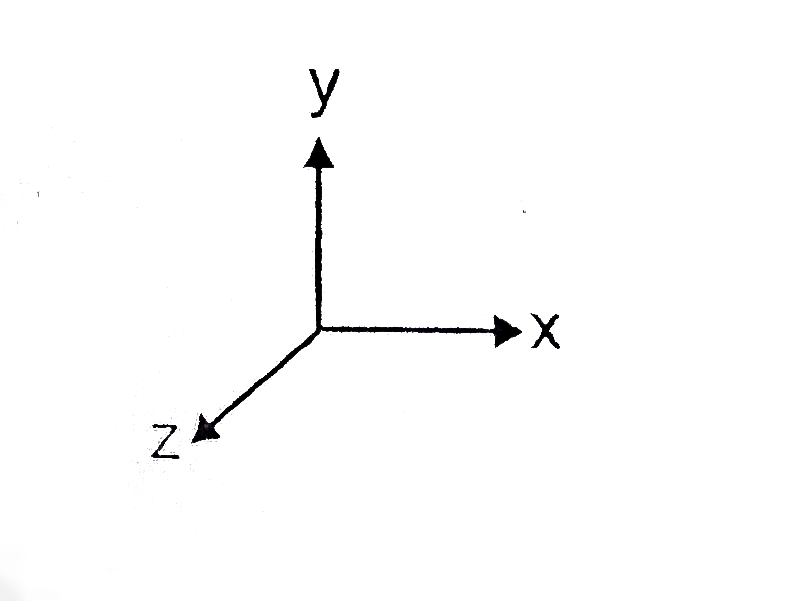→P+→Q is a unit vector along x-axis. If →P=ˆi−ˆj+ˆk, then what is →Q?
ˆi+ˆj−ˆk
ˆj−ˆk
ˆi+ˆj+ˆk
ˆj+ˆk
The correct Answer is:B
(b) Given P+1=ˆi−ˆj+ˆk
and P+Q=ˆi−ˆi+ˆj+ˆk=ˆj−ˆk
Topper's Solved these Questions
- BOOK - MHTCET PREVIOUS YEAR PAPERS AND PRACTICE PAPERSCHAPTER - SCALARS AND VECTORS EXERCISE - Exercise 2 (Miscellaneous Problems)20videos
SCALARS AND VECTORS
- BOOK - MHTCET PREVIOUS YEAR PAPERS AND PRACTICE PAPERSCHAPTER - SCALARS AND VECTORS EXERCISE - Exercise 2 (Miscellaneous Problems)20videos
SCALARS AND VECTORS
- BOOK - MHTCET PREVIOUS YEAR PAPERS AND PRACTICE PAPERSCHAPTER - ROTATIONAL MOTION'EXERCISE - MHT CET Corner35videos
ROTATIONAL MOTION'
- BOOK - MHTCET PREVIOUS YEAR PAPERS AND PRACTICE PAPERSCHAPTER - SEMICONDUCTORSEXERCISE - MHT CET Corner25videos
SEMICONDUCTORS
Similar Questions
Let a vector →a be coplanar with vectors →b=2ˆi+ˆj+ˆk and →c=ˆi−ˆj+ˆk. If →a is perpendicular to →d=3ˆi+2ˆj+6ˆk, and |→a|=√10. Then a possible value of [→a→b→c]+[→a→b→d]+[→a→c→d] is equal to :
View SolutionLet →a=ˆi+2ˆj+3ˆk,→b=2ˆi+ˆj+ˆk,→c=3ˆi+2ˆj+ˆk and →d=3ˆi−ˆj−2ˆk, then .
If →a×(→b×→c)=p→a+q→b+r→c, then find value of p,q are r.View Solution
Knowledge Check
- Question 1 - Select One
The unit vector along →A=2ˆi+3ˆj is :
A2ˆi+3ˆjB2ˆi+3ˆj2C2ˆi+3ˆj3D2ˆi+3ˆj√13 - Question 2 - Select One
Position vector →A is 2ˆi
Position vector −→B0 is 3ˆj
ˆi,ˆj,ˆk are along the shown x,y, and z is

Geometrical representation of →A isA−−−→2unitsB↑2unitsC←−−−2unitsD¯¯¯¯¯¯¯¯¯¯¯2units - Question 3 - Select One
Let →a=ˆi+ˆj+ˆk,→b=ˆi−ˆj+2ˆk and →c=xˆi+(x−2)ˆj−ˆk. If the vector →c lies in the plane of →a & →b, then x equals
A0B1C−4D−2
If →a is a unit vector such that →a׈i=ˆj then find →a
View Solutionverify that→a×(→b+→c)=(→a×→b)+(→a×→c), "when"
(i)→a=ˆi−ˆj−3ˆk,→b=4ˆi−3ˆj+ˆkand→c=2ˆi−ˆj+2ˆk
(ii) →a=4ˆi−ˆj+ˆk,→b=ˆi+ˆj+ˆk and →c=ˆi−ˆj+ˆk.View SolutionIf →a=5ˆi−ˆj−3ˆk and →b=ˆi+3ˆj−5ˆk, then show that the vectors (→a+→b) and (→a−→b) are perpendicular.
View SolutionFind the angle between the vectors →a and →b, when
(i) →a=ˆi−2ˆj+3ˆk and →b=3ˆi−2ˆj+ˆk
(ii) →a=3ˆi+ˆj+2ˆk and →b=2ˆi−2ˆj+4ˆk
(iii) →a=ˆi−ˆj and →b=ˆj+ˆk.View SolutionLet →a=ˆi+ˆj+ˆk,→b=ˆi−ˆj+2ˆk and →c=xˆi+(x−2)ˆj−ˆk. If the vector →c lies in the plane of →a and →b then x equals
View Solution

